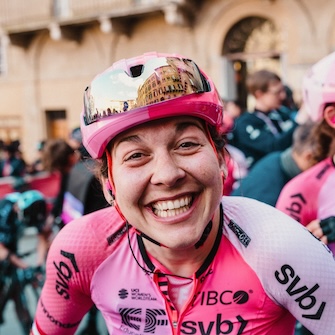Good day and thank you for reading this week’s Wheel Talk Newsletter! Whoever said time trials are boring?? The Olympic ITT on Saturday was wild, helped in large part by the weather. A race favourite walked away with gold in her final year of racing, and the silver and bronze medal winners surprised many, but not for the same reasons. There were plenty of impressive performances and plenty of crashes. And somehow I am even more excited for the road race now!

Wheel Talk
Enter your email address to get the latest news and analysis from the women’s peloton delivered directly to your inbox!
Get the latest news and analysis from the women’s peloton delivered directly to your inbox!
A moment for the Olympic mountain bike cross-country race…
Pauline Ferrand-Prévot asserted her dominance over the race early on, but the clear winner long before the line was in sight (figuratively, because laps) didn’t take any excitement out of the rest of the race.
We had Puck Pieterse’s impressive start, flat tyre and come-back and eventual fourth place. Jenny Rissveds, winner in Rio de Janeiro in 2016, riding to bronze was a highlight, given what she has been through and overcome in the last eight years since winning gold at 22. Evie Richards, who was in bed with a concussion only seven weeks before the race, rode to a massive fifth. And then of course Haley Batten claimed silver, the USA’s first Olympic medal in MTB XCO since Georgia Gould’s bronze in 2012. Batten also broke a wheel early in the race and had to battle back into medal contention.
Not exactly one to show big emotions, Ferrand-Prévot’s reaction when she crossed the line first was the result of years of Olympic disappointment. At the 2016 Olympics, the then-world champion walked away mid-race after what had already been a disappointing season. She returned to Tokyo in 2021 a different person, again the world champion, but still, it wouldn’t be her day. She would finish 10th, one place below Batten.
It seems those two losses needed to happen for the fairytale story the world witnessed on Sunday. In front of thousands of French fans, in her final season on the mountain bike, Ferrand-Prévot finally got the gold medal that had eluded her for eight years. Her tears were replicated worldwide, and her raw emotion, especially coming from a woman not usually given to such open displays of feeling, spoke volumes. Not only had she won gold, she’d done it on home soil, with her family in attendance, in front of her home crowd. As the French flag was raised to her national anthem, thousands of voices sang out to her. The term “dream come true” doesn’t even come close.

At the end of 2024, Ferrand-Prévot will hang up her mountain bike and return to road racing, a discipline she left behind in 2018. She is rumoured to be joining Visma-Lease a Bike, and in an interview after the Olympic mountain bike event, she was not shy about her goals.
“I will try to win the Tour de France next season.”
The 2025 season was already shaping up to be a good one, with the transfer market resembling an anthill and Anna van der Breggen coming out of retirement. A year from now we might be talking about Van der Breggen vs. Ferrand-Prévot vs. the new crop of riders who have risen since they left road cycling vying for the yellow jersey at the Tour de France.
Racing continues…
At the Olympic road race!
The Basics:
Sunday, August 4, 2024 @ 13:45 CET
Live coverage: Live coverage: 🇺🇸 NBC/Peacock, 🇬🇧 BBC/ Discovery+, 🇦🇺 Nine Network, 🇨🇦 CBC
Distance: 158 km, hilly
A longer and more in-depth preview will be up on Escape Collective in a few days, with detailed information about the course and contenders.
Wheel Talk Podcast
Gracie, Loren and I spent the vast majority of this week’s episode praising Grace Brown (who could blame us) but we also talked about the TT crashes, the weather, and the other riders who deserve some love. Then we preview the road race and try to suss out who is going to win on Sunday.
Let’s Discuss …
Race day changes when the weather turns.
Even before the rain started to fall on the eve of the Olympic time trial the course was already technically challenging, if you compare it to something like the out-and-back course of USA nationals that determined who would race in stars and stripes. But with bad weather comes a whole host of new challenges. If a rider wakes up the morning of a race to rain falling behind their windows, what changes do they need to make prior to the start that could make or break their day?
First of all, it depends on the race. If the time trial is a straight road, out and back, the result is unlikely to change because of the weather. But for something like the Olympic time trial we watched on Thursday, in a city centre with changing road surfaces and substances on the roads, there are so many things that can go wrong (or right).
The obvious preparation that needs to happen long before the start of the race is bike handling. Riders who are more comfortable handling their bikes on wet roads are going to be more adept at navigating the turns. There will still be incidents, of course, but there are adaptations a rider needs to make on wet roads vs. dry in terms of handling.
At an Olympic-level event, it’s safe to assume that most of the top competitors know how to turn a time trial bike around dry corners, but in the wet, there are small changes that would lose you two seconds in the dry but gain you … not crashing in the wet. Take both Lotte Kopecky and Chloe Dygert. Kopecky is without question a fantastic bike handler, but even she took a turn with her body at the wrong angle and went down. Dygert crashed while crossing from tarmac to cobbles. The American started pedalling too close to the turn and the offset of her body was too much on the slick surface. On a dry surface that wouldn’t have resulted in a crash, but with wet roads it’s a recipe for disaster.
When the corners are wet any braking that the rider needs to do needs to happen long before the corner. There is less room for error on a wet corner, so you need to brake before going into the corner when still moving in a straight line vs. brakiing in the corner. Avoiding leaning the bike over when crossing paint on the road, manhole covers or surface changes is important. What a rider can normally get away with in a dry corner, they will not get away with when that same corner is wet.
Riders who have perfected those skills will, obviously, do better in the wet.
Mindset is a huge part of bike racing, no matter the conditions. When it comes to the Olympic time trial, we can assume that the wet vs. dry conditions mindset doesn’t come into play quite as much as it might in a race that has lower stakes. The athletes at the Olympics are already under such immense pressure, internally and probably externally as well, and have been preparing for this one effort for so long that a bit of rain is unlikely to mentally break them. You’d assume they’d been preparing themselves mentally for the race as much as physically. But there are still some things in your brain that can come into play. Adjusting your handling from wet to dry is as much mental as it is physical. Grace Brown trusted that if she eased into the corners and went all out on the flats, she would make time, but Dygert was trying to attack a corner like you’d do in a dry race.

In a road race mentally preparing for a wet day is something some riders love (Gracie Elvin) and others despise. There are riders who line up and have already lost because they may be so miserable about the wet conditions.
Equipment is a tangible thing that needs to be adjusted. Just like on the dry hot days, we see riders warming up in ice vests, doing everything they can not to get too warm, if it’s raining you need to do everything you can not to get cold. Rain jackets and proper shoe covers are important, staying out of the rain as much as possible prior to the start. In the race clear lenses are needed for better visibility.
Bike-wise, lower tyre pressure, fresh brake pads and more chain lube. Mechanics will usually put on fresh tyres to try to avoid a puncture, which is more likely in the rain due to debris washing onto the road.
Rain adds a bit of something extra to a race. In the case of the Olympic time trial, it added an extra element of truth to the race of truth. But even if the world champion Dygert hadn’t gone down, Grace Brown still would have won on Thursday. With almost a minute and a half buffer on second, there’s no question who was the best prepared for the race and the conditions.
A picture worth a couple of words

This is everything.
Taylor Swift Ilona Maher!
Have you been watching women’s rugby sevens? If not you’re really missing out! The Rugby Sevens aren’t a commitment, only 16-ish minutes of playtime and it goes by very fast. Even if you haven’t watched women’s rugby, you may have seen the social media presence of Ilona Maher, one of the USA’s star players. The Vermonter has taken the internet by storm with her humour and body positivity, and I am a huge fan.
Until next time!
Thanks so much for reading this week’s Wheel Talk newsletter. I will be back next week, after what is hopefully a fantastic road race. Until then you can find me on the EC Discord! Or on the ground in Paris!
Did we do a good job with this story?


